If you own an online store with a million-dollar annual sales, you will likely need to consider an enterprise-level eCommerce platform. Two of the most trusted SaaS-based platforms for enterprises are Shopify Plus vs BigCommerce Enterprise, and that's what we will break down in today's article. In this article, LitExtension – #1 Shopping Cart Migration Expert will help you determine which to use based on these criteria:
- Pricing
- Performance & scalability
- Security
- Multi-store management
- B2B features
- Headless commerce
- Customization & flexibility
- Support
- Apps & integration
Let's delve into it!
What Is Shopify Plus?
Shopify Plus is the enterprise platform of Shopify, giving access to much more powerful features and integrations, underlying code, as well as dedicated and comprehensive support than other Shopify plans. Thanks to its powerful features for enterprises, Shopify Plus is currently the home for over 56,000 websites worldwide (according to BuiltWith), trusted by popular brands such as Allbirds, Murad Skincare, Colorpop, and many more.
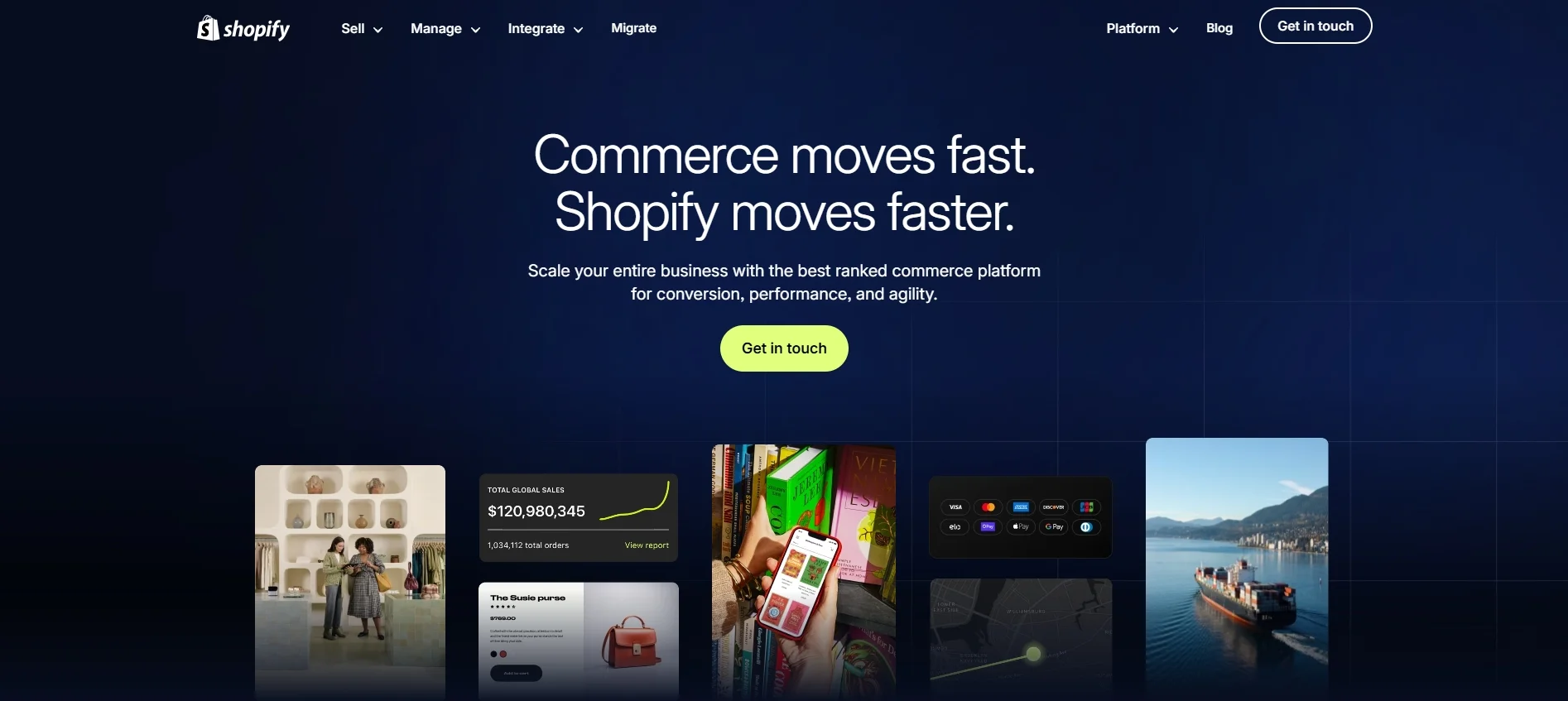
Now, let's have a brief overview of Shopify Plus's advantages and disadvantages.
Shopify Plus advantages:
- Ease of use and intuitive interface.
- Massive app store (huge number of integrations for nearly any functionality).
- Well-suited for rapid scaling and handling high traffic surges.
- Excellent omnichannel features for selling across multiple channels.
- Strong brand recognition.
Shopify Plus disadvantages:
- Some advanced customization may require using Shopify's proprietary Liquid templating language.
- Lack of control over SEO.
- Can become more expensive with many third-party apps and transaction fees.
What Is BigCommerce Enterprise?
BigCommerce Enterprise is the platform for high-volume BigCommerce brands. It offers out-of-the-box functionalities and integrations, allows 99.99% uptime, and seamlessly handles huge traffic to ensure the highest conversion rate for your store. Thanks to its powerful set of functions, BigCommerce has been trusted by famous brands in the world, such as Wovenbyrd, Just Sunnies, Grenson, and many more.
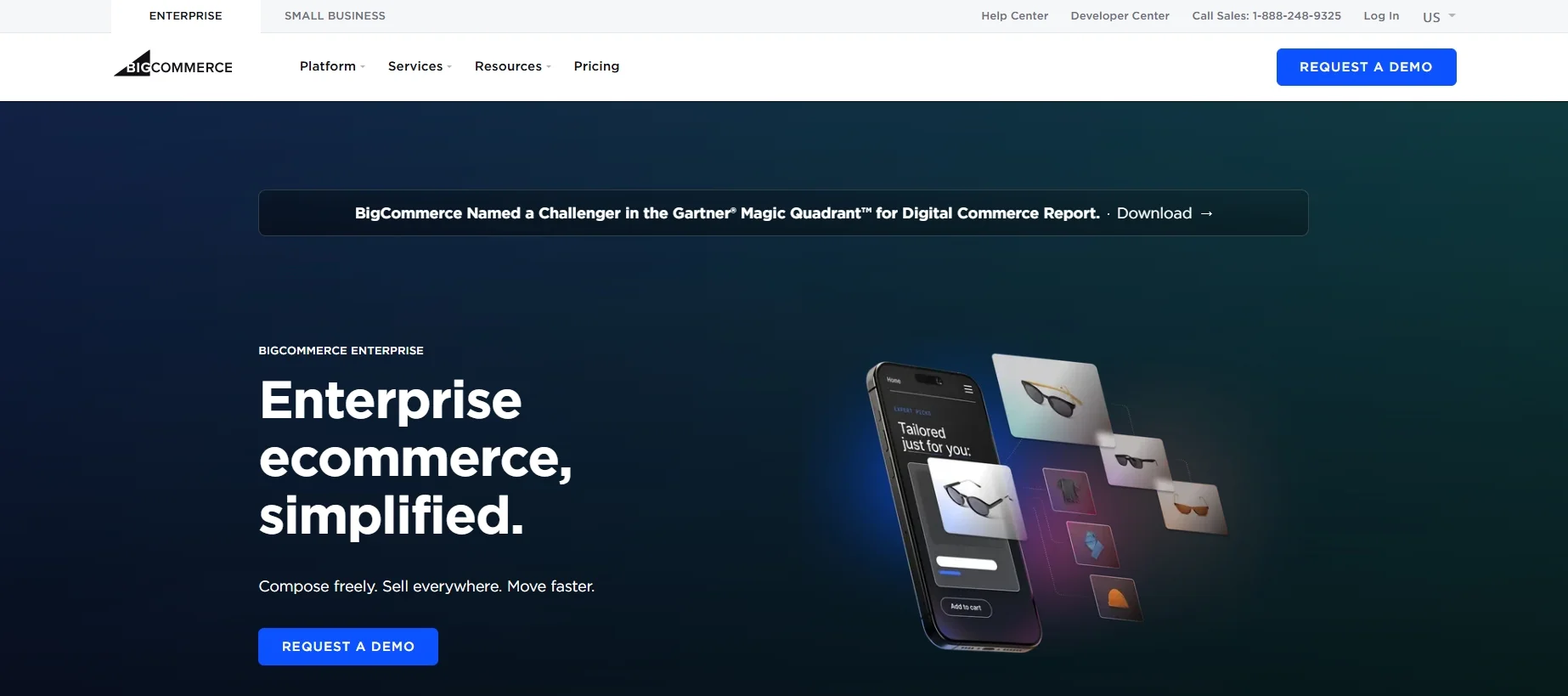
Let's take a moment to discuss the advantages and disadvantages of using BigCommerce Enterprise.
BigCommerce Enterprise advantages:
- Robust built-in features, possibly reducing the need for some third-party apps.
- Strong B2B capabilities like negotiated pricing, quote management, and customer groups.
- Open API for extensive customization.
- Can often be slightly more affordable than Shopify Plus at similar scales.
BigCommerce Enterprise disadvantages:
- The user interface may be slightly less intuitive than Shopify for some.
- While extensive, the app marketplace can be a bit smaller than Shopify's.
Shopify Plus vs BigCommerce Enterprise Comparison
Both Shopify Plus vs BigCommerce Enterprise are heavyweights in SaaS-based eCommerce solutions for enterprises. However, the “best” platform isn't a one-size-fits-all answer. The key lies in understanding your specific enterprise needs. Before comparing Shopify Plus vs BigCommerce Enterprise, let's have some questions in mind:
- How much traffic and transactions do you currently handle, and what are your growth projections?
- Do you have a vast number of SKUs, complex product options, or niche product configurations?
- Is your focus on wholesale, direct-to-consumer, or a hybrid model?
- Do you sell in multiple countries, necessitating multi-currency and tax regulation support?
- How deeply do you need to customize the storefront and underlying business logic?
- What systems (ERP, CRM, marketing automation) must integrate seamlessly with your eCommerce platform?
If you're in a rush, you can take a look at our Shopify Plus vs BigCommerce Enterprise comparison for better insights into these two.
Pricing
Moving to the first part of the Shopify Plus vs BigCommerce comparison, let's discover how much money you need to invest in each platform.
Shopify Plus pricing
Shopify Plus's detailed pricing is not public on its website and is based on your sales volume. You need to contact them to get the exact range. Normally, the price will start at $2,500 USD/month for a one-year term or $2,300/month for a three-year term. The other costs that you might have to pay to run your store on Shopify Plus include:
- Credit card processing fee: The credit card processing fee of Shopify Plus varies by country. For example, in the U.S., you will have to pay 2.15% + $0.30 for each domestic transaction on domestic Visa and MasterCard and an extra 1% on AMEX and international cards. If you are not using Shopify Payments but other payment gateways like PayPal or Skrill, you have to pay an extra 0.15% on top of whatever your current credit card processing fees are.
- Development cost: If you use a Shopify pre-made theme, the build cost will be between $0 and $380. Nevertheless, if you demand custom features for your store, the development fee will be much higher since you have to pay developers or an agency to customize the code.
♦ Pro tip: If you are using other platforms and want to compare their costs with Shopify, you can visit this page and calculate the total cost of ownership by providing the following information:
- Your online revenue
- Your current platform
- Platform cost (optional)
- Operating and support costs (optional)
- Your business URL
Once you have filled in this information, you will receive the result of your calculation.
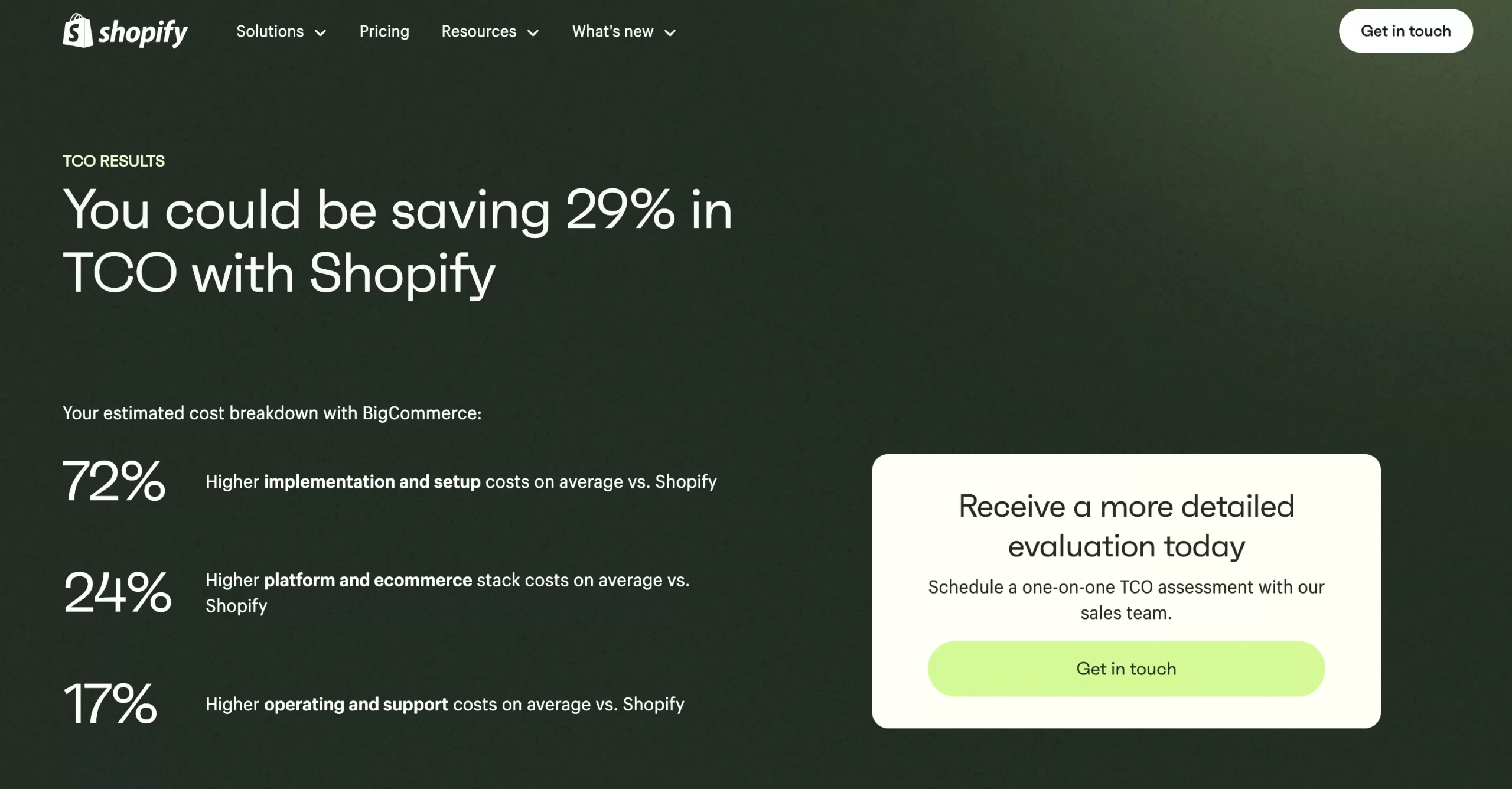
BigCommerce Enterprise pricing
Similar to Shopify Plus, there is no detailed pricing displayed on the BigCommerce website. They also require you to contact them to get custom BigCommerce pricing. It is worth noting that BigCommerce proudly states that its custom pricing is lower than both Magento and Shopify Plus. Normally, these below are the costs you may encounter:
- Platform fee: BigCommerce Enterprise's price starts at $1,000 per month and can range up to $15,000 per month. BigCommerce determines your pricing based on the sales that you can make. The same as Shopify Plus, the pricing of BigCommerce Enterprise is negotiable.
- Credit card processing fee: The processing fee for debit and credit cards begins at 2.9% + $0.30 per transaction for all BigCommerce plans if you use the default payment option, PayPal powered by Braintree.
- Development cost: BigCommerce pre-made themes cost from $145 to $235, which is pretty high in comparison to Shopify. It will also cost more development fees if you require more customization.
✧ You may also visit BigCommerce Enterprise or read our BigCommerce pricing to know the cost of building a BigCommerce Enterprise business.
The verdict: It's a tie!
In the Shopify Plus vs BigCommerce Enterprise pricing battle, the winner depends on the specific needs and business model of the merchant.
Performance & Scalability
When choosing between Shopify Plus vs BigCommerce Enterprise, performance is a crucial factor to consider, and that's what we are discovering in this section.
Shopify Plus performance & scalability
Shopify Plus is designed with speed and reliability at its core. The platform operates on a global Content Delivery Network (CDN) that helps stores load fast no matter where customers are located. Shopify Plus stores benefit from an industry-leading 99.99% uptime, ensuring that businesses remain operational even during high-traffic sales events like Black Friday or Cyber Monday.
In terms of load handling, Shopify Plus automatically optimizes resources during traffic spikes. Businesses do not need to manually scale their servers or infrastructure. Shopify’s hosted solution means that the technical maintenance, including security patches and server updates, is managed entirely by Shopify. As a result, merchants can focus on growing their stores without worrying about backend issues.
Scalability is another strong point for Shopify Plus. The platform can easily support merchants moving from hundreds to thousands of orders per day. Shopify's infrastructure handles large product catalogs, global traffic, and complex checkout flows without sacrificing speed. Additionally, Shopify Plus offers features like multi-channel selling across marketplaces (Amazon, eBay) and social media (Instagram, Facebook), enabling growth beyond a single website.
BigCommerce Enterprise performance & scalability
On the other hand, BigCommerce Enterprise also prioritizes performance by offering a highly stable, multi-layered hosting environment. The platform boasts an average page load time of less than two seconds, which plays a critical role in boosting SEO rankings and customer conversion rates. BigCommerce, like Shopify Plus, ensures a 99.99% uptime, backed by a detailed Service Level Agreement (SLA).
When discussing scalability, BigCommerce Enterprise shines with its open SaaS model. Businesses can take advantage of robust APIs, allowing them to connect third-party systems or build unique customer experiences. BigCommerce's architecture is modular, which means brands can add new services, marketplaces, and technologies as needed without overhauling their core systems.
The verdict: It's a tie!
Both Shopify Plus vs BigCommerce Enterprise provide top-tier performance and scalability. Shopify Plus is ideal for brands wanting a fully managed, high-speed experience with strong automation tools. Meanwhile, BigCommerce Enterprise offers greater technical control and flexibility, perfect for businesses that need to tailor every aspect of their commerce ecosystem as they scale.
Security
Security is one of the most important factors to consider when comparing Shopify Plus vs BigCommerce Enterprise. Both platforms provide robust protections to safeguard customer data and ensure seamless business operations. However, they take slightly different approaches to securing online stores.
Shopify Plus security
Shopify Plus offers a fully hosted, secure environment. Every Shopify Plus store comes with Level 1 PCI DSS compliance by default, which is the highest security standard for handling credit card information. Businesses do not need to set up their own compliance measures because Shopify manages all server maintenance, updates, and security patches automatically.
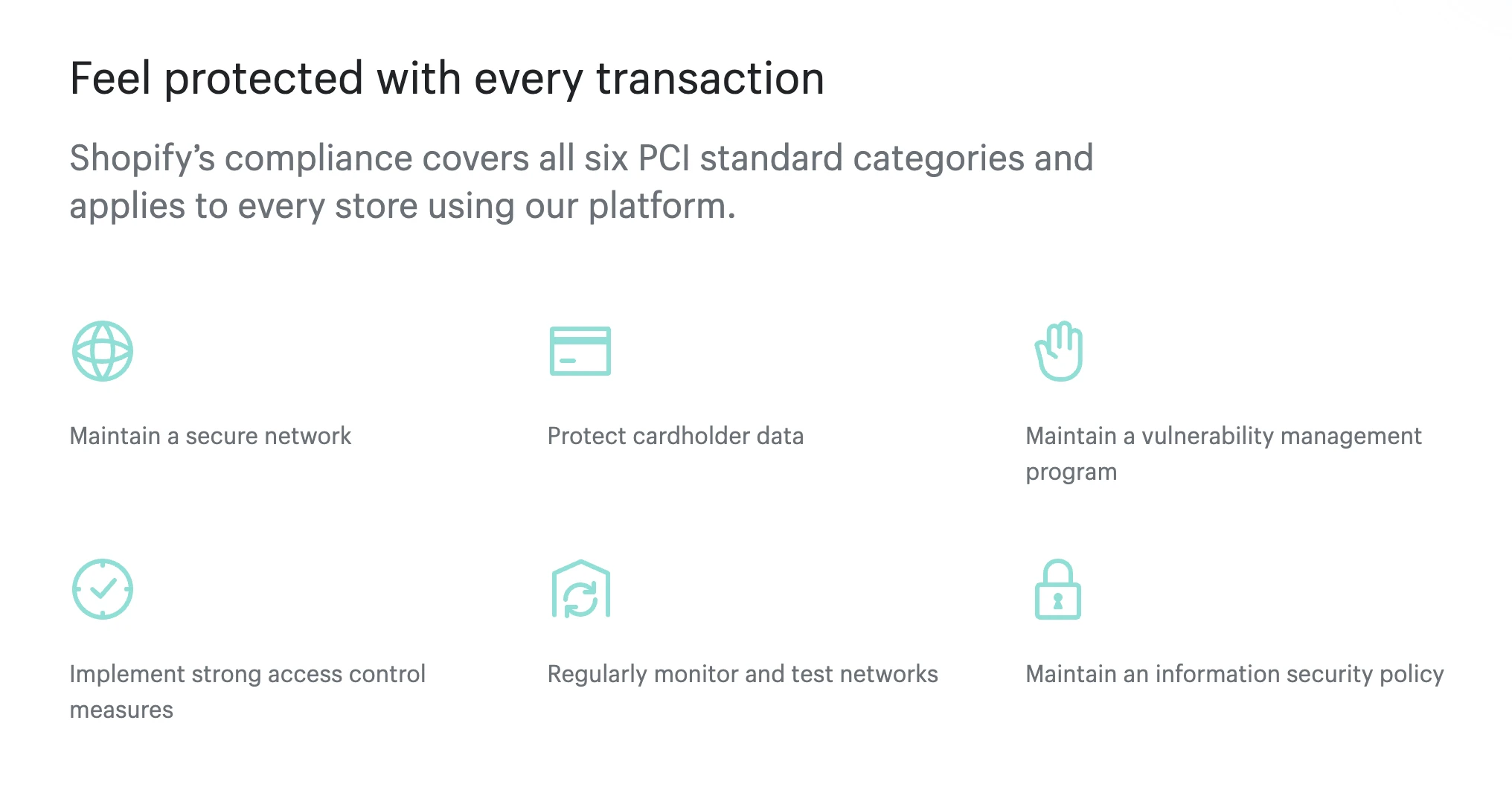
In addition, Shopify provides SSL certificates for every storefront, protecting all data transmitted between customers and the site. This platform also includes built-in fraud analysis tools that help merchants detect suspicious orders before they are processed.
Shopify’s global infrastructure is protected by DDoS prevention measures, automated backups, and 24/7 monitoring. Furthermore, Shopify Plus merchants can control access permissions with advanced staff account controls, allowing businesses to restrict sensitive data to authorized personnel only.
BigCommerce Enterprise security
On the other hand, BigCommerce Enterprise also delivers a strong security framework designed for large-scale businesses. Like Shopify, BigCommerce is PCI DSS Level 1 certified across its entire platform. This certification ensures that all payment data processed through BigCommerce is handled securely.
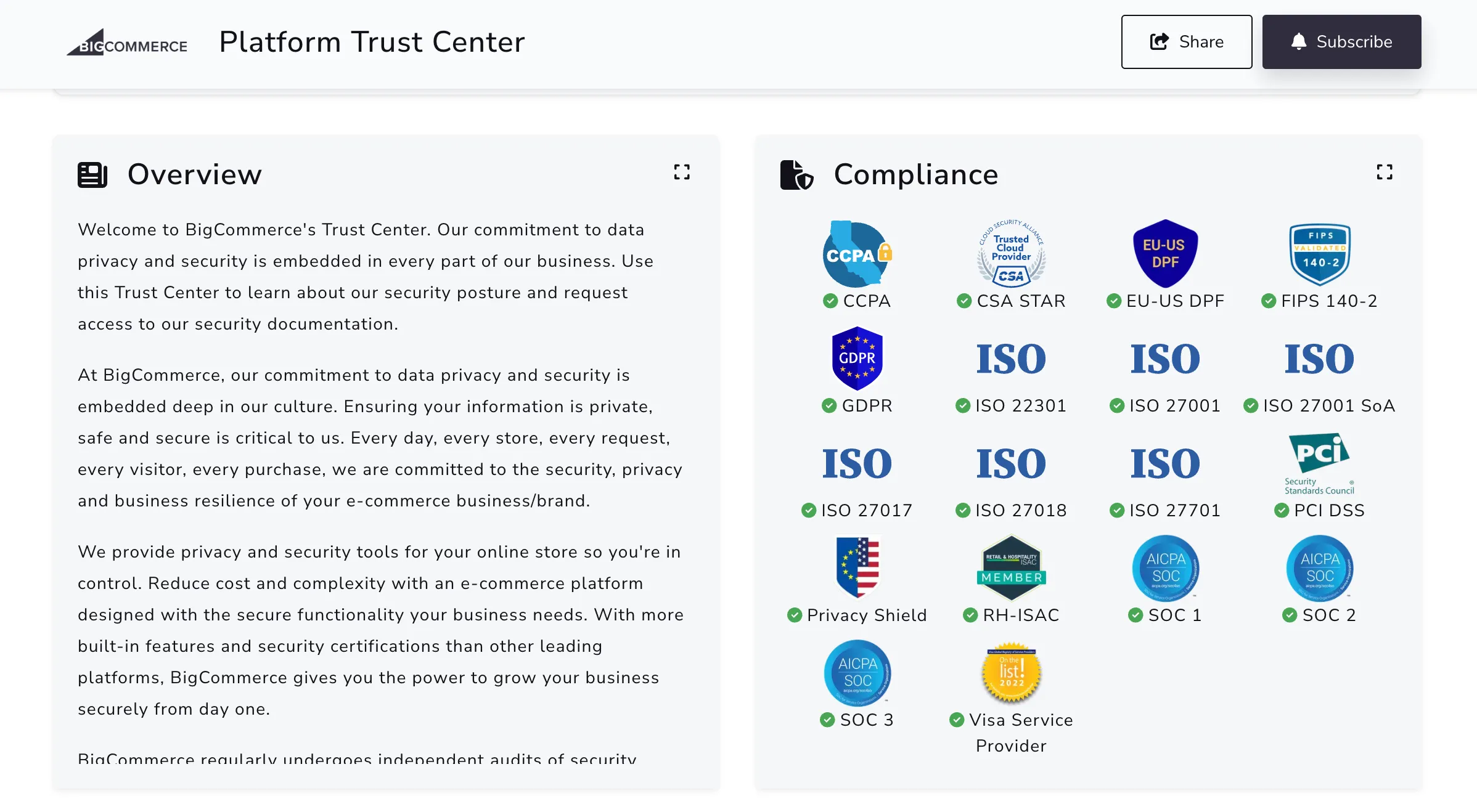
Additionally, BigCommerce provides free SSL certificates and offers advanced security headers for enhanced protection against threats like cross-site scripting and clickjacking. It is protected with enterprise-grade DDoS mitigation, automatic threat detection, and real-time system monitoring.
One area where BigCommerce stands out is its open SaaS architecture. Businesses have more flexibility to implement additional security layers through custom applications or third-party security services. While this provides greater control, it may also require more technical expertise compared to Shopify's fully managed environment.
The verdict: It's a tie!
In the Shopify Plus vs BigCommerce Enterprise security comparison, both platforms provide excellent protection that meets the highest industry standards.
Multi-store Management
In this round, let's discover the difference between Shopify Plus vs BigCommerce Enterprise in terms of multi-store management. It is important to consider different languages, products, and payment options when creating a website for different regions. If your company operates multiple brands, it is more efficient to use a platform that allows you to manage all websites centrally rather than managing them separately.
Shopify Plus multi-store management
Shopify Plus offers 3 features that allow multi-store management:
- Expansion store
- Currency converter
- Tax/regulatory support
- Multi-warehouse
Let's go into detail! Shopify Plus enables you to add 9 more storefronts for shoppers from various locations besides the main one. You can manage your store performance, employee accounts, user permission, and tools of all of your stores from only 1 dashboard. Each additional store will be charged based on your Gross Merchandising Value.

*Note: Additional stores cost $250/month each or a revenue share across all stores. A separate Shopify Plus contract is needed per brand. However, this Shopify Plus function has a few limitations. You cannot set individual product IDs per store or install apps independent of each store. You also cannot manage attributes at the global and local levels separately. The currency converter feature is only accessible for Shopify Payment users. When using this feature, the conversion fee is added to the final price and automatically converted based on the foreign exchange rate. It is important to note that you cannot set different prices for different locations when using this feature. With Shopify Plus, you can access automatic tax calculations. Built-in tax engines calculate sales taxes for numerous countries and regions, including the US, Canada, EU, Australia, and more. Finally, Shopify Plus lets you set up multiple locations to manage inventory and fulfill orders more efficiently. The maximum number of locations you can set for a Shopify Plus plan is 20.
BigCommerce Enterprise multi-store management
BigCommerce Enterprise also offers some features that allow multi-store management:
- Multiple websites
- Multi-currency and localized payment options
- Localized catalog and pricing
- International shipping
BigCommerce Enterprise plan is an exceptional solution for businesses that manage multiple storefronts. With this plan, you can easily launch various websites on BigCommerce and utilize a BigCommerce partner product information management system to keep track of all your product and marketing data while updating your global storefronts. This plan also offers the remarkable capability of the BigCommerce Stencil framework to set up localized content for each geographic location.

Furthermore, BigCommerce Enterprise gives you complete control over your storefront and allows you to create unique storefronts with distinct branding, URLs, and product catalogs. This feature is especially useful for targeting different customer segments, markets, or brands. You also have the flexibility to customize product catalogs, pricing, and promotions for your target regions. Overall, BigCommerce Enterprise is truly an exceptional platform for businesses that need to manage multiple storefronts with ease.
The verdict: Shopify Plus is slightly ahead.
When comparing Shopify Plus vs BigCommerce Enterprise for multi-store management and globalization, Shopify Plus clearly takes the lead. Shopify Plus provides a more streamlined, centralized system through its Organization Admin feature, making it much easier for brands to expand into new regions, manage different currencies, and create localized storefronts without added complexity.
B2B Functionality
If you are a large company, you are likely to have customers who buy in bulk to resell, and selecting the right eCommerce solution for B2B is fundamental to your enterprise's success. Let's compare Shopify Plus vs. BigCommerce Enterprise B2B functionality below.
Shopify Plus B2B functionality
On Shopify Plus, there are 2 main options for managing a B2B storefront:
- Shopify Wholesale Channel
- Customizing the theme for different groups of tagged customers
Shopify Wholesale Channel is an ideal tool for expanding your business and catering to the wholesale market. It allows you to utilize the same data as your main store and invite your customers to the wholesale channel while assigning them to different groups. You can easily manage pricing, product visibility, and order limits separately in the wholesale channel area.
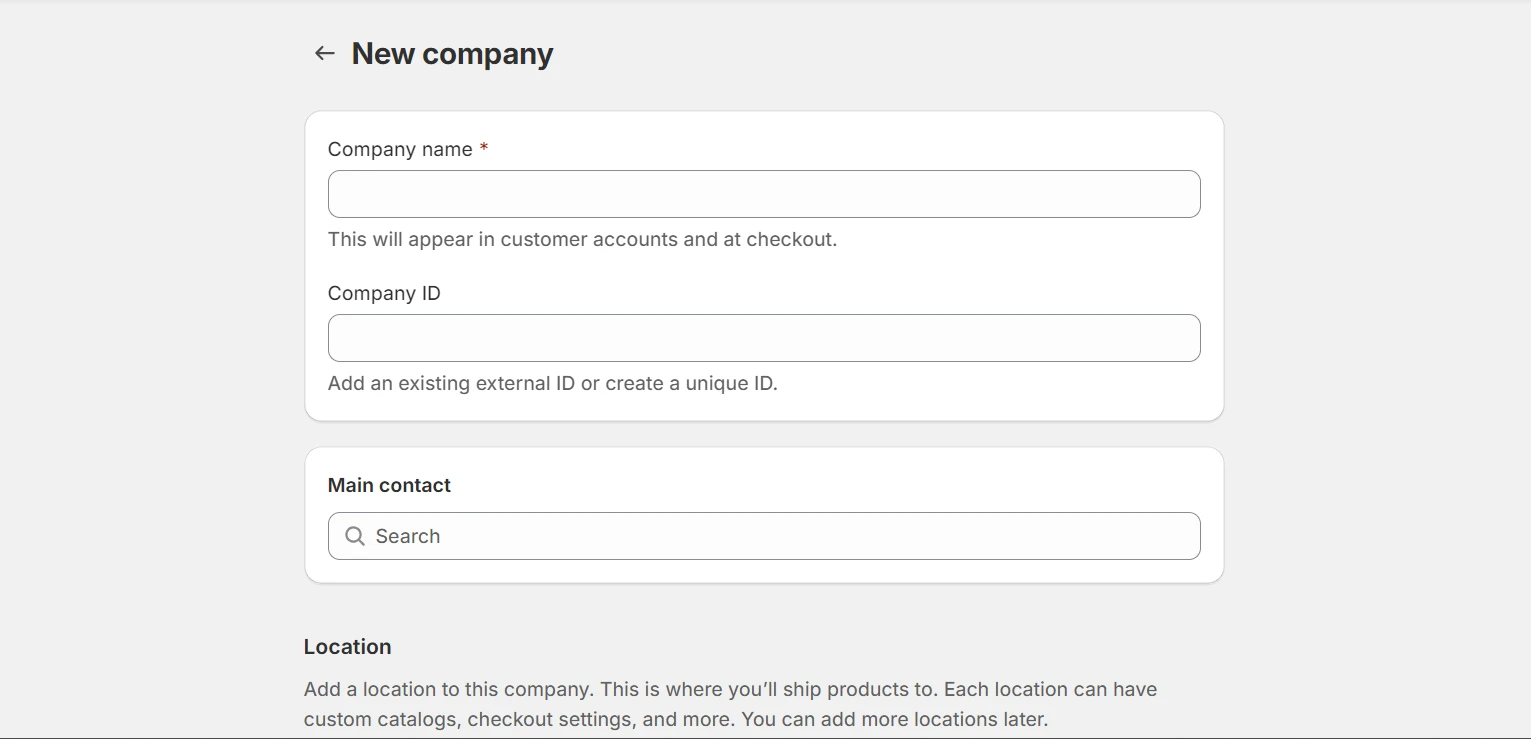
However, the customization of the front-end template of the Shopify Wholesale Channel is limited. You can use customer tags in Shopify to create different customer groups and offer them different pricing, availability, discounting for different products, and more.
BigCommerce Enterprise B2B functionality
BigCommerce is a remarkable SaaS platform specializing in B2B. It is a powerful tool that offers you great control over managing vast catalogs with a customer and pricing segmentation that goes down to the SKU level. BigCommerce Enterprise comes with several built-in features that cater to B2B businesses.

Some of the default B2B features include:
- Customer-specific pricing through price-lists
- Quote/CPQ management
- Volume/tiered pricing that can also be set at the customer level
- Management of purchase orders and credit terms
- Customized catalogs, shipping options, availability, payment methods, and content for different customers
- Customer segmentation features
- Advanced shipping capabilities, such as customized shipping rates through ShipperHQ
- Advanced product management features, including attribute sets, custom fields, variant handling, etc.
The verdict:
In the comparison of Shopify Plus vs BigCommerce Enterprise for wholesale and B2B functionality, BigCommerce Enterprise comes out on top. BigCommerce provides built-in B2B features like custom price lists, customer group segmentation, purchase orders, quote management, and bulk pricing rules without the need for heavy third-party app reliance.
Headless Commerce
A headless architecture is a design that separates the front end (the part of a website or app that customers see and interact with) from the back end (the part that manages order processing, inventory, etc.). This approach gives you complete control over the customer experience, using any frontend technology you prefer.
Shopify Plus headless commerce
Shopify Plus offers robust Storefront APIs and developer toolkits to build customized storefronts entirely. The Shopify Hydrogen framework, designed explicitly for React developers, streamlines the creation of fast and performant headless storefronts. While Shopify Plus's architecture was traditionally linked to its own storefront technology, these advancements offer greater front-end flexibility.
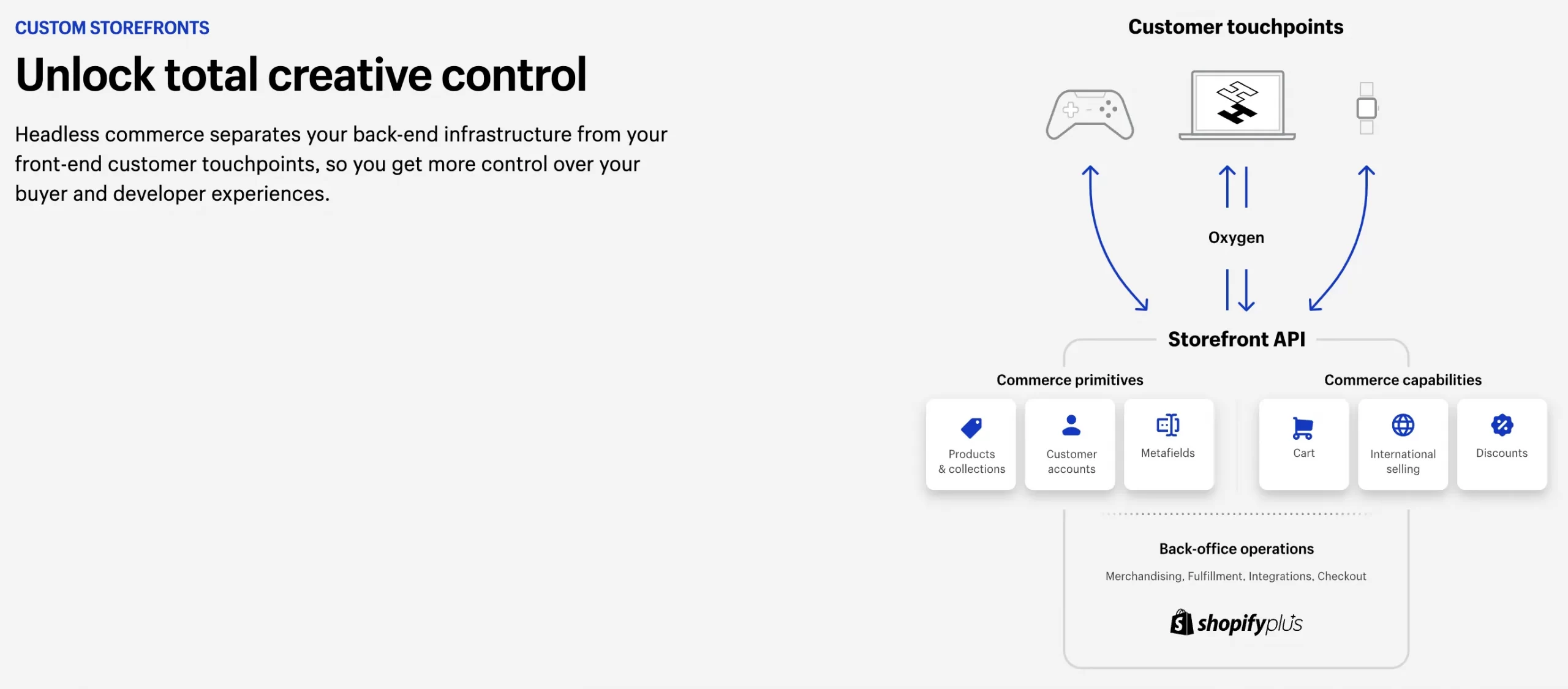
However, implementing true headless solutions on Shopify Plus can still require significant development expertise. This approach is best suited for businesses seeking the robust backend features and reliability of Shopify Plus while prioritizing a fully customizable and innovative front-end customer experience.
BigCommerce Enterprise headless commerce
The architecture of BigCommerce Enterprise is specifically designed to support headless commerce. It clearly separates the front-end presentation layer from the powerful back-end functionality.
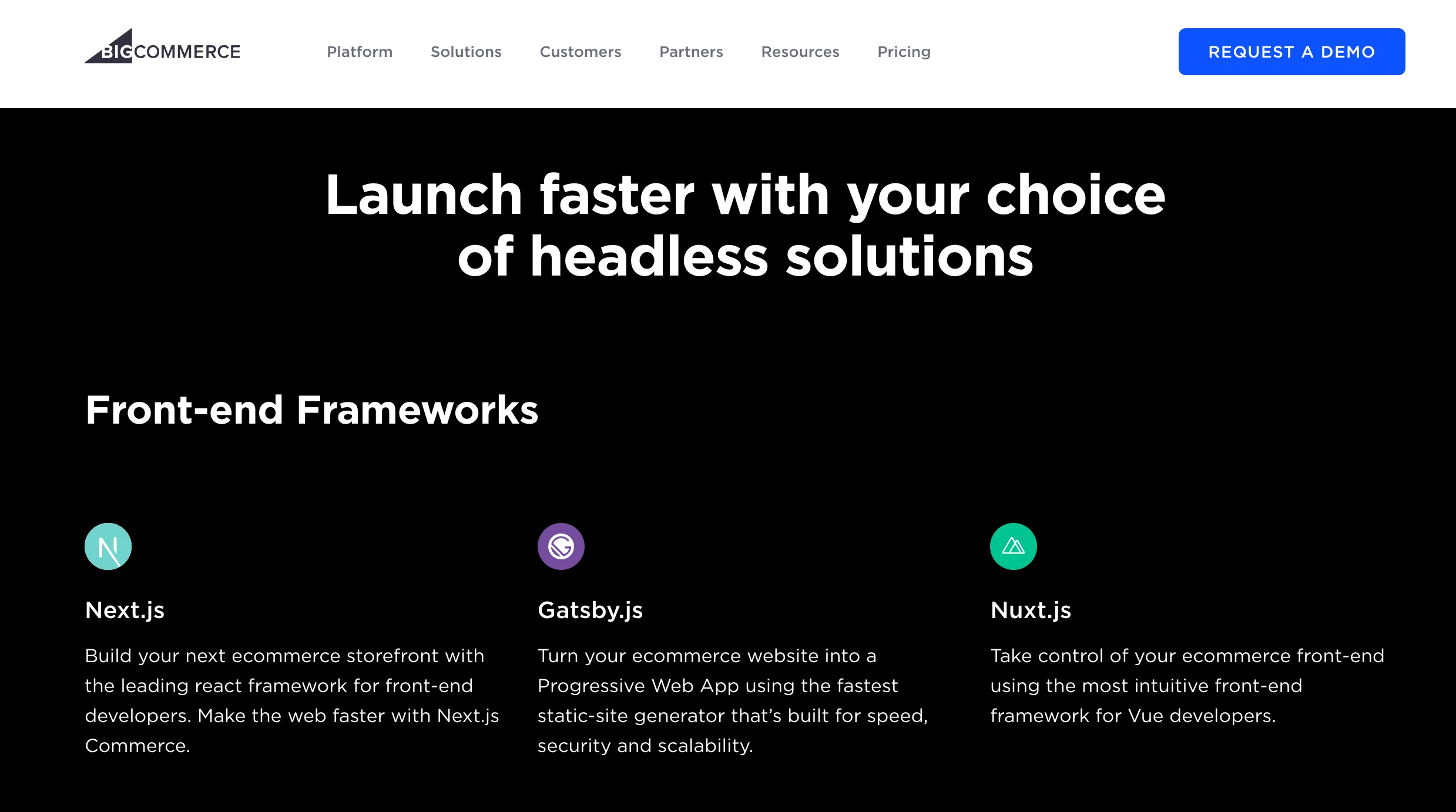
With its extensive APIs, the platform offers unrestricted access to all platform data, allowing for seamless integration with any frontend framework, technology stack, or CMS of your choice. This approach provides unmatched flexibility for enterprises looking to create highly innovative and cross-channel customer experiences.
The verdict:
In the comparison of Shopify Plus vs BigCommerce Enterprise for headless commerce, BigCommerce Enterprise holds the advantage. BigCommerce was built with an open SaaS and API-first architecture, giving businesses greater flexibility to design unique front-end experiences while keeping a strong commerce engine on the backend. Its unlimited API calls, easy CMS integrations, and support for a wide range of front-end frameworks make it an excellent choice for brands serious about headless strategies.
Customization & Flexibility
In terms of storefront flexibility, Shopify Plus vs BigCommerce Enterprise have storefront APIs, allowing a headless approach that brings more front-end flexibility.
Shopify Plus customization
Large-scale stores usually require an enormous number of product variants such as colors, sizes, and styles. However, Shopify Plus has some limitations in terms of the number of product types it provides, such as simple products, downloadable products, and virtual products. You can still use product variants for configurable products, sell downloadable products with additional apps, and sell gift cards like any other products. But it's essential to keep in mind that Shopify Plus limits specific configurable products to 100 variants and 3 options.
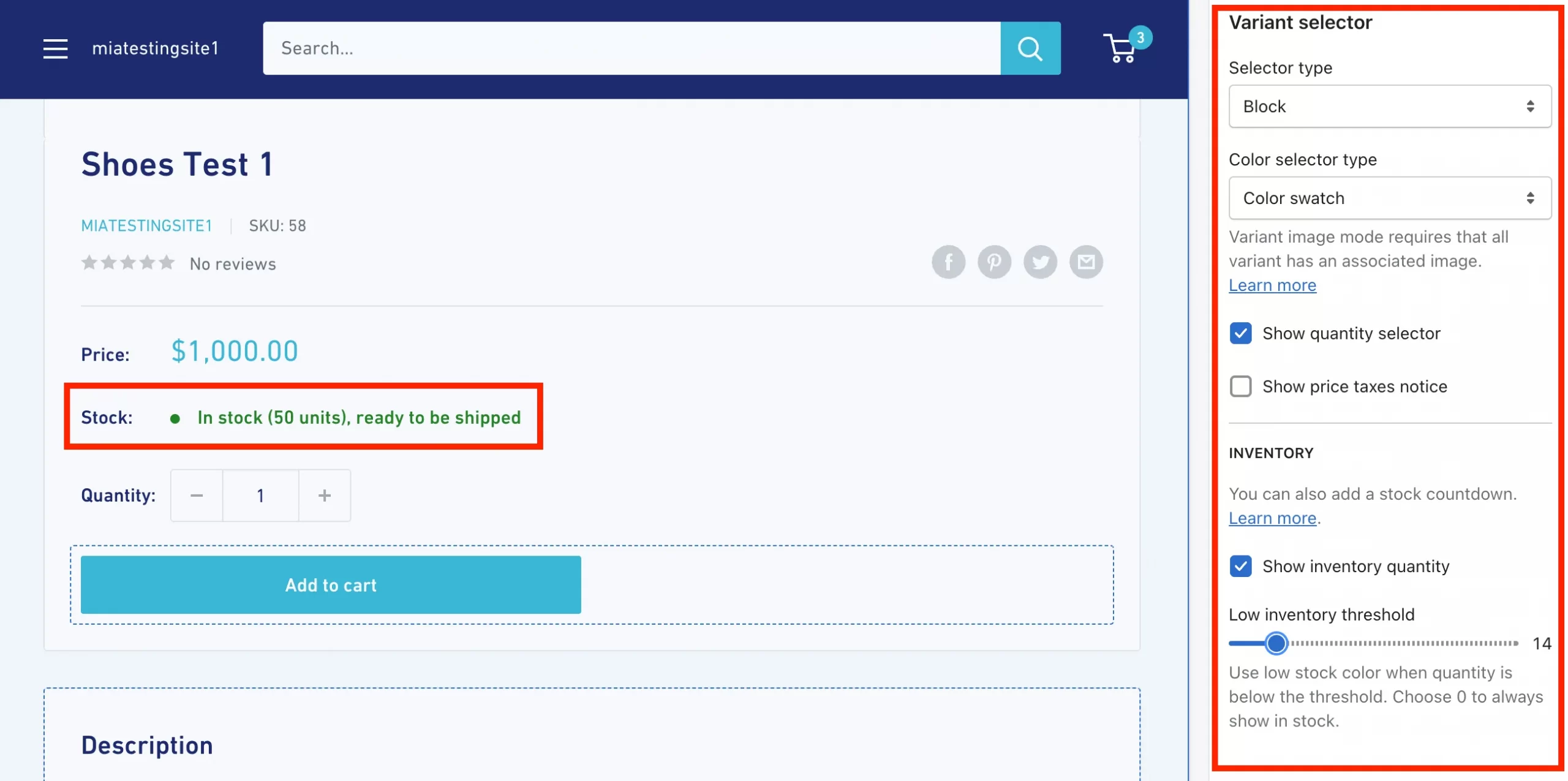
Despite these limitations, Shopify Plus offers many merchandising options. Available base order options are:
- Best selling
- Product name: A-Z and Z-A
- Price high-low and low-high
- Newest and oldest
To overcome limitations, Shopify offers a Script Editor function called Shopify Scripts, which allows you to personalize customer shopping experiences.
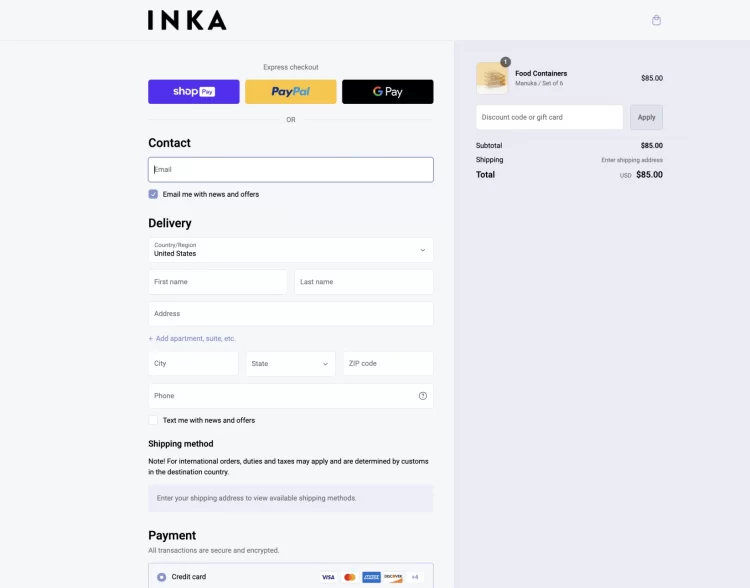
Shopify provides its proprietary language, Liquid, for storefront and theme customization. While Liquid can be challenging, it offers extensive control. Finally, Shopify's API grants developers access to almost all platform data points, allowing for deep integration and customization.
BigCommerce Enterprise customization
BigCommerce Enterprise offers businesses with intricate product lines a highly flexible and versatile solution, with over 600 product options available. The platform offers Product Option Filtering to help customers find products faster. Moreover, BigCommerce Enterprise's Optimized One-Page Checkout feature streamlines the checkout process. The platform's checkout API and storefront API provide additional customization options.
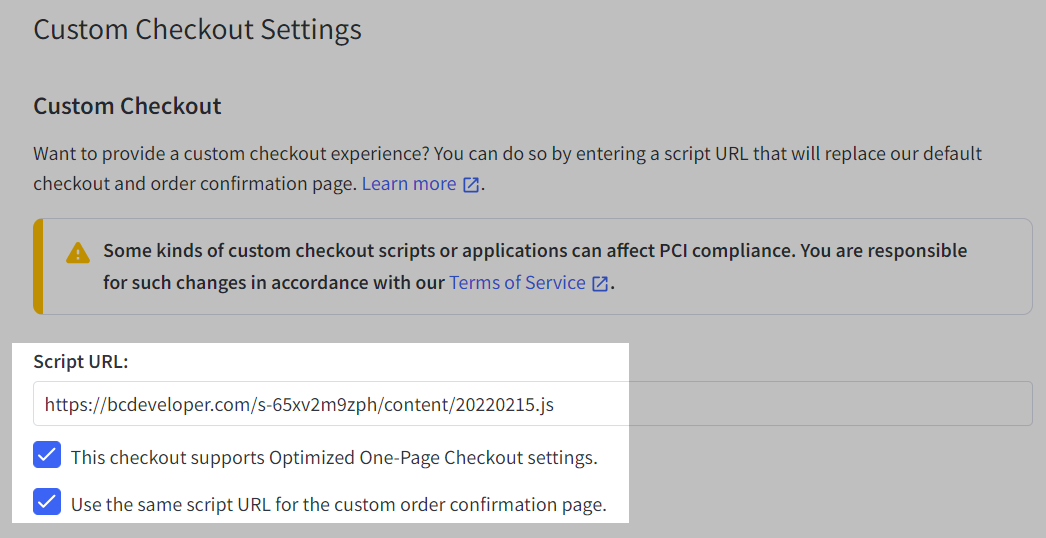
Integration with WordPress and Acquia empowers users to create a content-led, fully customizable front-end store. BigCommerce Enterprise's Open API Architecture allows extensive customization and integrations, often considered more flexible than Shopify's.
The verdict:
When comparing Shopify Plus vs BigCommerce Enterprise in terms of customization and flexibility, BigCommerce Enterprise takes the win. BigCommerce offers an open SaaS architecture, giving businesses greater freedom to customize both the front-end and back-end of their stores. Developers can fully control the user experience with server-side code access, flexible APIs, and advanced integration options, all without being limited by the platform’s core structure.
Support
The bigger your business is, the more problems you may have while running and maintaining it. Hence, it's a pity if we don't mention the support aspect in this head-to-head comparison between Shopify Plus vs BigCommerce Enterprise.
Shopify Plus Support
Shopify Plus offers 24/7 priority support to all merchants. Every Shopify Plus business gets access to a dedicated Merchant Success Manager. This manager helps businesses grow by offering advice on strategy, marketing, and technical improvements.
In addition to the personalized support, Shopify Plus merchants can access the Shopify Plus Academy, an exclusive learning hub filled with courses, guides, and webinars. This helps internal teams improve their skills without relying entirely on external help.
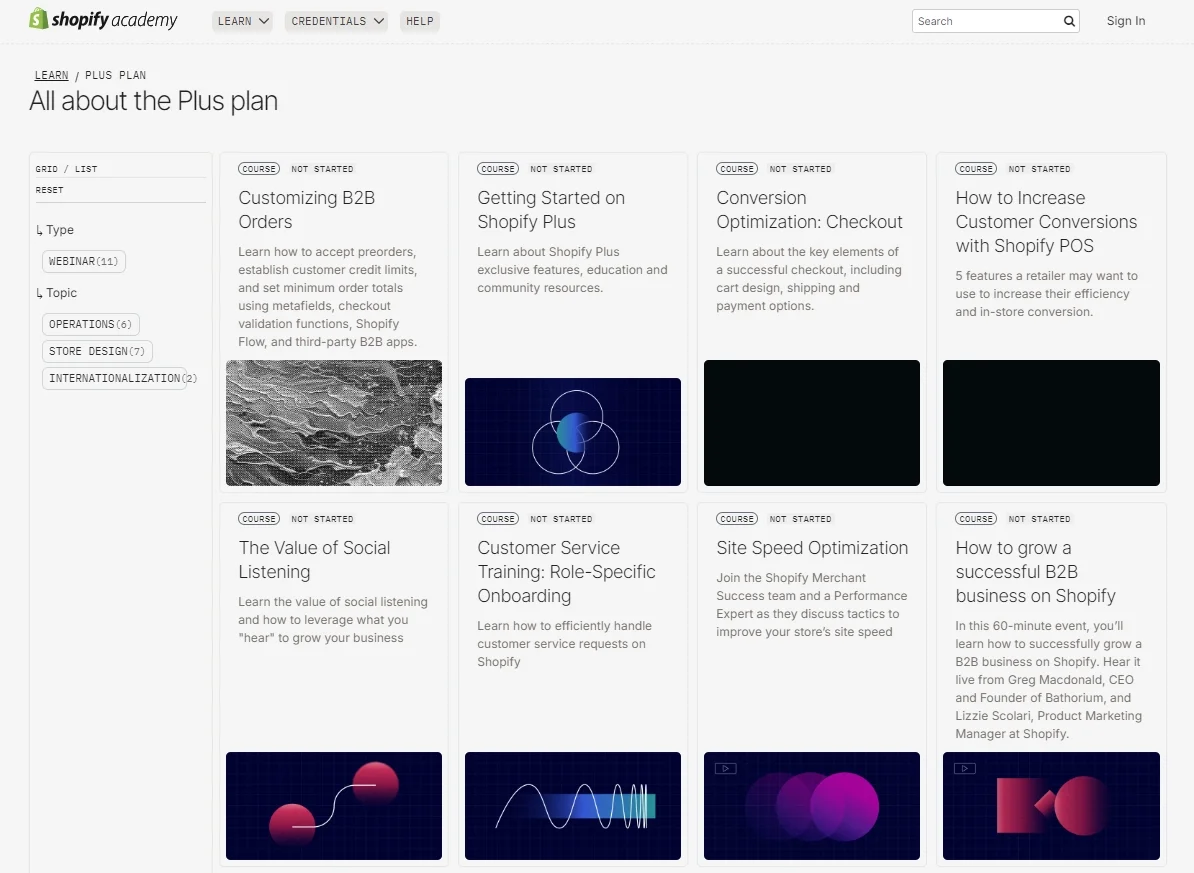
Shopify's live chat, phone, and email support are fast and efficient. Businesses also have access to Shopify’s large community forums, certified agency partners, and a wide range of help documents. Because Shopify controls the full platform, its support team can quickly solve technical problems without needing to escalate issues to third parties.
BigCommerce Enterprise support
BigCommerce Enterprise also delivers 24/7 premium support with a focus on rapid response times. Enterprise merchants benefit from a dedicated Account Manager who works closely with them on both strategic planning and technical troubleshooting.
One major advantage of BigCommerce Enterprise is its priority routing system. When merchants open a support ticket, it gets automatically escalated to senior technical teams. This results in faster solutions, especially for complex technical challenges.
BigCommerce also provides access to its BigCommerce University, which offers online training, certifications, and detailed resources. Additionally, merchants can tap into a strong ecosystem of BigCommerce partners for specialized development, design, and integration support.

Since BigCommerce is an open SaaS platform, its support sometimes requires coordination between internal and third-party solutions, depending on the customizations involved. However, the technical team is highly trained to work across diverse setups.
The verdict: It's a tie!
In the Shopify Plus vs BigCommerce Enterprise support battle, both platforms offer excellent service, but with slightly different strengths. Shopify Plus is ideal for businesses looking for seamless, all-in-one support that covers both business growth and technical needs inside a tightly controlled ecosystem. Meanwhile, BigCommerce Enterprise stands out for businesses needing technical depth and faster escalations for custom-built solutions.
Apps & Integration Capabilities
When comparing Shopify Plus vs BigCommerce Enterprise, the ability to integrate with third-party apps and services is a key factor. Fortunately, both platforms offer strong integration options, but they differ in how they approach app ecosystems and custom connections.
Shopify Plus apps & integration
Shopify Plus gives merchants access to the Shopify App Store, which features over 8,000 apps across categories like marketing, shipping, accounting, customer service, and analytics. This large ecosystem means that businesses can quickly extend their store’s functionality without heavy custom development.
Many of Shopify's apps are built specifically to work out of the box, making setup easy even for teams without technical expertise. Shopify Plus merchants also get access to exclusive apps like Shopify Flow for automation, Launchpad for scheduling events, and Script Editor for customizing checkout processes.
Additionally, Shopify integration with major platforms such as ERP systems, CRM tools, and third-party logistics (3PL) providers is also straightforward. Shopify Plus partners with key business platforms like Salesforce, HubSpot, NetSuite, and Microsoft Dynamics, ensuring smooth operations as businesses scale.

For more custom needs, Shopify Plus supports a strong API infrastructure, allowing developers to build private apps or create complex workflows that connect different systems.
BigCommerce Enterprise apps & integration
On the other hand, BigCommerce Enterprise approaches integrations with an open SaaS mindset. The BigCommerce App Marketplace offers around 1,200 carefully vetted apps, covering all critical areas like marketing, shipping, B2B management, and accounting.
While BigCommerce has fewer apps than Shopify, it focuses heavily on deep, enterprise-level integrations. Many integrations are pre-built to work with complex systems like Oracle NetSuite, SAP, Brightpearl, and ShipperHQ, which makes BigCommerce a powerful platform for businesses with advanced backend needs.
BigCommerce Enterprise also offers unlimited API calls, which gives developers greater freedom to connect external systems, automate operations, and build custom functionalities without worrying about hitting limits.
Additionally, BigCommerce allows easy integration with leading headless CMS systems, marketplaces like Amazon and eBay, and various point-of-sale (POS) solutions. Its flexibility makes it ideal for businesses that want to build highly tailored commerce ecosystems.
The verdict:
In the Shopify Plus vs BigCommerce Enterprise comparison for apps and integration, both platforms are strong but serve slightly different needs. Shopify Plus wins for businesses that want a large, plug-and-play app ecosystem with easy setups and a wide range of choices for different business functions. Meanwhile, BigCommerce Enterprise is better suited for businesses that prioritize deep, enterprise-grade integrations and need extensive API freedom.
Which One Is Worth The Cost: Shopify Plus or BigCommerce Enterprise?
Shopify Plus vs BigCommerce Enterprise are both powerful platforms. Even though Shopify is a market leader, BigCommerce is rapidly strengthening its position with extensibility and advanced features. Shopify Plus is great for businesses that:
- Prioritize rapid scaling
- Need a user-friendly platform
- Need moderate customization
- Focus on both B2B and B2C
BigCommerce Enterprise is great for businesses that:
- Focus on strong native B2B features
- Want deep frontend and backend control
- Need more complex product catalogs
- Have in-house developers or an agency familiar with BigCommerce
Therefore, it is up to you to determine which criteria are more important to your business before deciding whether to go with Shopify Plus or BigCommerce Enterprise.
You might also be interested in reading:
FAQs about Shopify Plus vs BigCommerce Enterprise
What is the difference between Shopify Plus and BigCommerce Enterprise?
The main difference between Shopify Plus and BigCommerce Enterprise lies in their structure and flexibility. Shopify Plus offers a fully hosted, all-in-one solution with a strong focus on ease of use, rapid scaling, and a vast app ecosystem. It is ideal for fast-growing brands that want a simple, powerful setup.
BigCommerce Enterprise, on the other hand, uses an open SaaS model, giving businesses greater control over customization, integrations, and backend operations. It is better suited for companies that need deep flexibility and technical freedom.
What are the limitations of Shopify Plus?
While Shopify Plus is powerful, it does have some limitations. Shopify Plus relies on its proprietary Liquid coding language, which can restrict backend customization compared to open platforms. Businesses with complex or highly customized needs may find certain technical restrictions. Additionally, Shopify Plus may require third-party apps for features that are built-in on other platforms, which can add extra costs and operational complexity.
What is the disadvantage of BigCommerce?
The main disadvantage of BigCommerce is that it often requires more technical resources to fully maximize its open architecture. While BigCommerce offers great flexibility, businesses may need skilled developers to build custom experiences or maintain integrations. The app marketplace is also smaller compared to Shopify's, which means fewer plug-and-play solutions are available for non-technical users.
Why should I upgrade to Shopify Plus?
Upgrading to Shopify Plus makes sense for businesses that are growing rapidly and need access to advanced features like automation (through Shopify Flow), custom checkout experiences (using Scripts), and powerful multi-channel selling. Shopify Plus also provides better scalability, dedicated account management, priority support, and access to exclusive tools that are not available on lower Shopify plans. It is ideal for brands that want a smooth path to expansion without handling technical infrastructure themselves.
Bottom Line
Shopify Plus vs BigCommerce Enterprise both have many powerful functions as well as limitations, especially around multi-store management. It seems like the latter allows more complex options, while the former aims at focus and simplification for merchants. Hopefully, this article has contributed to your decision.
We hope that our insightful analysis of key features between Shopify Plus vs BigCommerce Enterprise will help you decide which one is the cream of the crop. If you are planning to migrate to BigCommerce, migrate to Shopify, or migrate between these two platforms or any other platforms, LitExtension is willing to help!
As the world-leading shopping cart migration solution with 200,000+ successful migrations for 100,000+ worldwide customers in the last 13 years, LitExtension can transfer all your data, including products, customers, and orders, automatically, quickly, and accurately, with no technical skills required. You can find the list of LitExtension supported carts here. If your platform is not on the list, contact our team via live chat to make a request.
For any further information about LitExtension, please feel free to contact us! Don't forget that we have an all-inclusive eCommerce blog section and a dynamic community for all eCommerce fellows!

